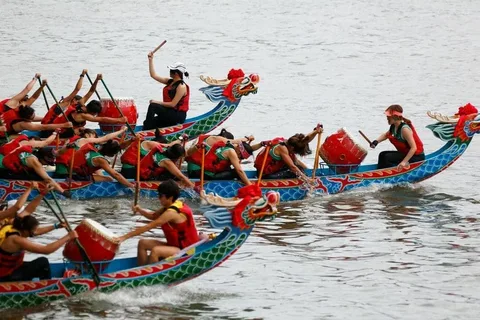The Dragon Boat Festival, also known as Duanwu Festival, is one of the most fascinating and vibrant traditional Chinese holidays. It blends cultural heritage, ancient legends, and thrilling sportsmanship. Celebrated across China and in many parts of the world, the festival is a living symbol of unity, patriotism, and tradition. From dragon boat races to delicious zongzi (sticky rice dumplings), the festival brings people together to honor history while embracing joy and excitement.
History of the Dragon Boat Festival
The Dragon Boat Festival dates back more than two thousand years. Its origins are deeply tied to the story of Qu Yuan, a patriotic poet and loyal statesman during the Warring States period. After being exiled by rivals, Qu Yuan drowned himself in the Miluo River in 278 BCE on the fifth day of the fifth lunar month.
Villagers, who admired his loyalty, raced in boats to search for his body. They beat drums to scare away evil spirits and threw rice dumplings into the river to protect his remains from fish. This heartfelt act became the foundation of dragon boat races and the tradition of eating zongzi during the festival.
Cultural Significance of the Festival
The Dragon Boat Festival carries layers of meaning beyond celebrations:
-
Honoring Qu Yuan: His loyalty and sacrifice make him a lasting cultural icon of righteousness and patriotism.
-
Protection from Evil Spirits: The festival, held at the start of summer, was believed to protect against disease and bad energy through rituals, herbs, and loud celebrations.
-
Community and Unity: Dragon boat racing fosters teamwork, cooperation, and social cohesion.
-
Preservation of Tradition: Customs such as eating zongzi, wearing herbal sachets, and folk celebrations connect generations to Chinese traditions and Chinese culture.
Customs and Activities
Dragon Boat Races
The most iconic tradition is dragon boat racing. Long, beautifully decorated boats shaped like dragons speed through rivers and lakes, powered by synchronized rowers. The races are thrilling to watch and symbolize courage, unity, and collective strength. Today, dragon boating has become a global festival sport with professional teams and international championships.
Eating Zongzi
A central culinary highlight is zongzi, or sticky rice dumplings, wrapped in bamboo leaves. These dumplings come in sweet and savory varieties, filled with ingredients like pork, salted egg yolk, or red bean paste. Families often prepare them together, and gifting zongzi to friends and relatives is a cherished tradition.
Wearing Sachets and Hanging Herbs
To ward off illness and evil spirits, people wear small herbal sachets filled with mugwort and calamus. These are believed to bring health and protection. Homes are also decorated with herbs to maintain good fortune.
Drinking Realgar Wine
In ancient times, drinking realgar wine was thought to keep away evil spirits and disease. Although less common today, this custom remains a symbolic part of the festival in some regions.
Local Celebrations
Across China and beyond, celebrations vary. Some regions host fireworks, parades, and folk performances, each adding a unique touch to Chinese customs and the festival’s spirit.
Dragon Boat Festival Around the World
The festival’s influence extends well beyond China. With globalization and cultural exchange, dragon boat festivals are celebrated internationally.
-
In Singapore Dragon Boat Festival, Taiwan Dragon Boat Festival, Hong Kong Dragon Boat Festival, and Malaysia Dragon Boat Festival, large-scale boat races draw thousands of spectators.
-
In the United States dragon boat races, cities like New York dragon boat, San Francisco dragon boat, and Vancouver dragon boat host exciting events, attracting diverse participants.
-
The International Dragon Boat Federation, founded in 1991, promotes dragon boat racing as a professional sport, making it part of world competitions such as the World Games.
Conclusion
The Dragon Boat Festival is more than a Chinese holiday—it is a celebration of loyalty, tradition, and cultural heritage. From honoring Qu Yuan to enjoying zongzi and watching thrilling dragon boat races, it reflects values of unity, remembrance, and joy. Today, the festival is not only a cherished tradition in China but also a global festival that brings people together across borders.
For anyone new to the Dragon Boat Festival, participating—whether by cooking zongzi, cheering at a dragon boat race, or simply learning about its Chinese traditions—is a wonderful way to connect with one of the world’s oldest and most meaningful Chinese customs.
FAQs
What is the Dragon Boat Festival?
The Dragon Boat Festival is a traditional Chinese holiday honoring the poet Qu Yuan, marked by dragon boat races, eating zongzi, and protective customs.
When is the Dragon Boat Festival celebrated?
It falls on the fifth day of the fifth lunar month, usually in June, with the exact date changing each year.
What are dragon boat races?
These are fast-paced rowing competitions in dragon-shaped boats, requiring teamwork, rhythm, and endurance.
What is zongzi?
Zongzi are sticky rice dumplings wrapped in bamboo leaves, filled with sweet or savory ingredients, eaten during the festival.
Is the Dragon Boat Festival celebrated outside China?
Yes, it is celebrated worldwide, especially in places with large Chinese communities, such as Singapore, Malaysia, and the US.
Why do people race dragon boats?
The races symbolize the search for Qu Yuan’s body and represent unity, teamwork, and cultural spirit.
What other customs are linked to the festival?
Wearing herbal sachets, hanging mugwort and calamus, drinking realgar wine, and festive parades are all traditional practices.
